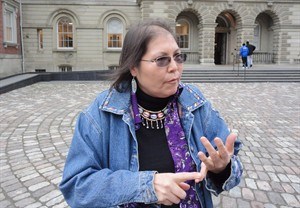
Marcia Brown Martel speaks outside Osgoode Hall in Toronto, on Dec.4, 2013. THE CANADIAN PRESS/Diana Mehta
Republished December 04, 2014 - 11:56 AM
Original Publication Date December 04, 2014 - 1:15 AM
TORONTO - The federal government needs to admit that thousands of aboriginal children were robbed of their cultural identities instead of continuing to fight an unprecedented lawsuit, the lead plaintiff and her lawyer said Thursday.
Their comments follow a Divisional Court ruling dismissing Ottawa's attempt to have the $1.3-billion class action thrown out without a hearing on its merits.
While the court stressed it wasn't weighing in on the suit's chances of success, it did decide the plaintiffs should at least have a chance to make their case.
"It is difficult to see a specific interest that could be of more importance to aboriginal peoples than each person's essential connection to their aboriginal heritage," the three-justice panel concluded.
"On this point, the importance of aboriginal rights cannot be disputed."
Under an agreement with the federal government that ran from December 1965 to December 1984, Ontario child welfare services placed an estimated 16,000 aboriginal children with non-native families.
The almost six-year-old lawsuit alleges the children caught up in the so-called '60s scoop suffered a devastating loss of cultural identity that Canada negligently failed to protect.
The children, the suit alleges, suffered emotional, psychological and spiritual harm due to the lost connection to their aboriginal heritage.
"I lost everything, including my name. I lost my family. I lost my language. I lost everything about my culture," lead plaintiff Marcia Brown Martel, chief of the Beaverhouse First Nation near Kirkland Lake, Ont., said Thursday.
"This should never have happened. It was wrong."
As a child, Martel was taken by child welfare officials and was adopted by a non-native family when she was nine. She reclaimed her heritage as an adult and returned to her reserve. She later discovered the Canadian government had declared her original identity dead.
"Canada needs to be brought to a place to acknowledge what has happened in Canadian history," Martel said via phone from northern Ontario. "The 60s scoop is an event that occurred in Canadian history. It is a fact."
A lower court ruled the lawsuit, initially certified as a class action in 2010, should be allowed to proceed but the government appealed, arguing the claim has no chance of success.
The Divisional Court disagreed, saying aboriginal claims should be afforded leeway given they are "undeveloped and fluid." It also said it didn't matter whether Ottawa might have been trying to do something positive for the children.
Erica Meekes, spokeswoman for Aboriginal Affairs Minister Bernard Valcourt, said in an email that the government was reviewing the court's decision to determine next steps.
Legal fights over aboriginal land claims or hunting and fishing rights are common but this is said to be the first time loss of cultural identity is being raised as an actionable legal wrong, said lawyer Jeffrey Wilson.
He called on the feds to honour the apology Prime Minister Stephen Harper made to victims of Canada's notorious Indian residential school system by settling this claim rather than appealing again — adding to the $1 million legal bill he estimates the government has spent to date.
The suit seeks $85,000 for each of the estimated 16,000 people caught up in the '60s scoop.
Martel said she wasn't optimistic anything would be settled quickly.
"I'm very apprehensive," she said. "It's taken a long time to come to this place."
News from © The Canadian Press, 2014